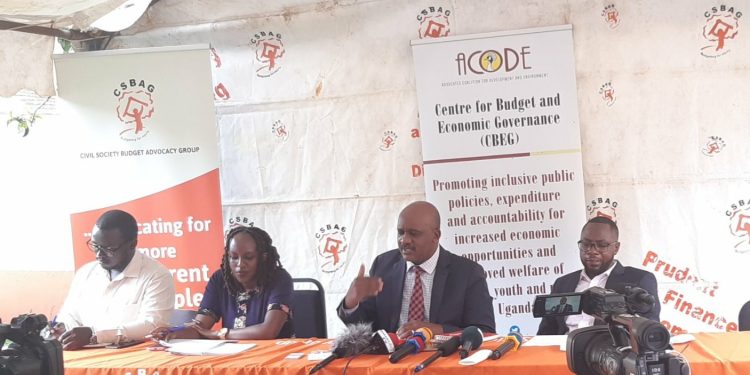Civil Society Organisations (CSOs), have rejected the proposed amendments in the Public Finance Management Act (PFMA) which seeks to allow Uganda National Oil Company (UNOC) to retain a portion of the proceeds from the sale of petroleum.
The bill was laid before parliament on September, 27 by the Ministry of Finance Planning and Economic (MoFPED).
Julius Mukunda, the Executive Director, Civil Society Budget Advocacy Group (CSBAG), told reporters that the Public Finance Management (PFM) Reform Strategy 2018-2023, requires all government ministries, departments and agencies that collect revenue to declare it through the consolidated fund, especially the Non-Tax Revenue.
However, Mukunda noted that the proposed amendments of section 57 of the PFMA, seek to allow UNOC to retain revenue and spend at source without approval or appropriation by parliament.
He said that the proposed ammendments are irrational on grounds that Uganda’s annual budget process is sufficient to accommodate any emerging financial needs of all government ministries, departments, agencies, and companies Like UNOC.
Mukunda added that there are existing agencies like the Uganda Revenue Authority (URA), who can spend at source to enable them meet their obligations but with clear guidelines.
“We advise the members of Parliament to consider section 14 o the URA Act, Cap 196 (1991), which allows URA to spend at Source on authorization of the minister, an amount not exceeding that appropriated by Parliament in any Financial year,” Mukunda said.
He noted that if the URA model is adopted, it will facilitate UNOC to meet its obligation without any interruptions.
Mukunda further added that, the clause if passed in its current form, shall give UNOC authority to deposit the balance of the proceeds retained after spending moneys for the purposes of subsection (5a) into the petroleum fund.
He noted that the drafters of the bill carefully chose may rather than shall, saying this will constrain the role of parliament in dealing with residual monies.
“If any may, is optional and such, it is possible that money from the petroleum fund can be expensed without parliamentary approval, the amendment shall weaken the existing accountability mechanisms,” he said.
Patrick Katabazi, the Executive Director Center for Budget and Tax Policy, proposed that section 58 and 59 of the PFMA should not be compromised, saying parliament should maintain its oversight and supervisory role over government entities as provided for in the PFMA 2015 and the constitution of Uganda.
“We strongly recommend that parliament should maintain that all budgets, workplans, processes and reports of UNOC remain subject to Parliament’s approval and not only Cabinet, and UNOC Board of Directors. Should UNOC have any shortfalls, these can be planned for in the PFMA, 2015” Katabzi said.
Penina Mbabazi from Southern and Eastern Africa Trade, Information and Negotiations Institute (SEATINI), advised government to amend Section 59 (3) of the PFMA to allow for recurrent expenditure, saying this will inherently support UNOC’s financial obligations arising from applicable petroleum agreements and JOAs in each Financial year which was approved in section 2(50 (a) and (b) of the bill.
Mbabazi, further suggested that government should develop a memorandum of understanding (MoU) between MoFPED, UNOC and Bank of Uganda (BoU) to access funds on call based on UNOC’s approved Investment workplans and budgets.
Joseph Mukasa Ngubwagye a senior research fellow at Advocates Coalition for Development and Environment (ACODE), urged MPs to reject the proposed amendments to the PFMA, 2015, in line with UNOC’s interest, saying the bill is likely to undermine the good strides already registered by the country in the management of public funds.
“Further still, the amendment when passed is likely to undermine the original intention o passing the PFMA, 2015,” Ngubwagye noted.









